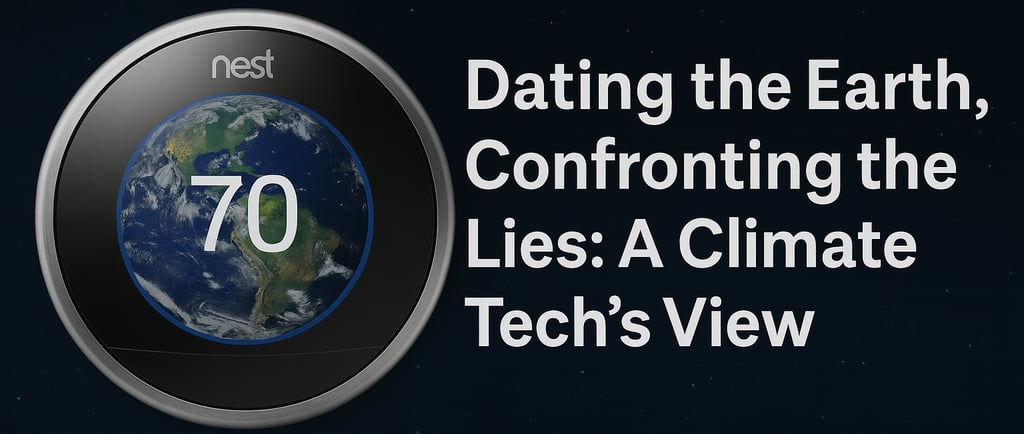Dating the Earth, Confronting the Lies: A Climate Tech’s View from the Trenches
Matthew Pasley
7/28/20253 min read


Lately, I’ve been watching Cosmos with Neil deGrasse Tyson—and something’s been stirring in me.
There’s this sense of awe, but also deep frustration.
Because the science is there. It’s beautiful. Elegant. Real.
But so many people refuse to even look at it.
Let’s talk about the age of the Earth for a second.
We’ve dated meteorite rock—believed to be remnants of the same material that formed our entire solar system.
These fragments consistently date back to 4.5 billion years ago.
We’ve also brought back rocks from the Moon—tested them with multiple radiometric methods.
Same result: ~4.5 billion years.
Then we go to Earth’s oldest known mineral: the zircon crystal found in Australia.
This ancient piece of crust?
Also dated to around 4.5 billion years.
Three independent sources—space rock, lunar rock, and Earth’s own ancient crust.
All pointing to the same story.
This isn’t wishful thinking.
It’s science confirming itself—through physics, through chemistry, and through time.
This foundation is what lets us date fossils.
It’s how we trust the timeline of life on Earth.
But here’s where it gets complicated.
Most people don’t start with the evidence.
They start with a presupposition:
“God created the Earth less than 7,000 years ago.”
So everything else—no matter how verifiable, how repeatable, how rock-solid—gets thrown out.
They think that’s safe.
But it’s not.
It’s actually a dangerous belief that ends up undermining all the science we rely on to understand our planet’s climate systems.
And that’s personal for me—because I’ve lived my life in the world of climate.
I’ve been in attics and crawlspaces as an HVAC tech, manipulating heat, pressure, and airflow to bring comfort.
Now I’m a community college instructor teaching others the same systems.
We use Earth’s raw materials, guided by the laws of thermodynamics, to create comfort.
What blows my mind is that many of those same laws—the ones I’ve built a career around—were discovered by people looking up at the stars, studying planetary motion, and trying to understand the universe.
And yet, we’re still stuck in magical thinking—believing that the “owner of the universe” is going to come down and reset the global thermostat like some divine HVAC tech.
That somehow, we can keep cranking the heat and burning through energy without consequence—because “God will fix it.”
But here’s the thing:
Every thermostat adjustment has a cost.
Kids don’t think about it—they’re not the ones paying the electric bill.
But the Earth is.
We act like God’s keeping us comfortable.
But it’s our planet taking the hit—quietly, steadily, and with increasing consequence.
Watching Cosmos again reminded me:
The universe doesn’t run on belief. It runs on laws—laws that we’ve spent centuries uncovering.
And if we keep pretending otherwise, we’re not just being ignorant.
We’re being negligent.
Wrestling with Belief in a Burning World
Watching Cosmos didn’t just make me think about science.
It made me reflect on my own beliefs—and how they’ve shifted.
This exploration isn’t just academic. It’s personal.
I grew up in a high-control religion, steeped in end-times prophecy, where we were told the world was going to burn—and only our version of truth would survive. I now see how that worldview distorted my ability to trust science, to think freely, and to recognize undue influence for what it is.
Climate denial?
It’s not just about science—it’s about control, identity, and fear.
I’ve lived in systems that made belief untouchable, that branded questions as betrayal.
So I recognize those same shadows now—lurking behind climate denial, behind anti-intellectualism, behind the comforting lie that “God will fix it.”
There’s an intersection here worth exploring—between climate science and belief change, between identity and evidence, between our need for comfort and our responsibility to wake up.
This post isn’t a conclusion. It’s a starting point.
I want to explore how systems of control, whether religious or political, condition us to resist the very ideas that could save us.
I want to map the edges of belief, and share what I find with anyone else who’s willing to wrestle with the hard questions.
Because belief isn’t neutral.
And in the face of a warming world, our ability to evolve what we believe might be the most important survival skill we have left.
Want to connect and follow along as I share the things I'm studying and learning? I share practical life advice, financial insight, entrepreneurship, programming, and more!
https://substack.com/@mattpasley
